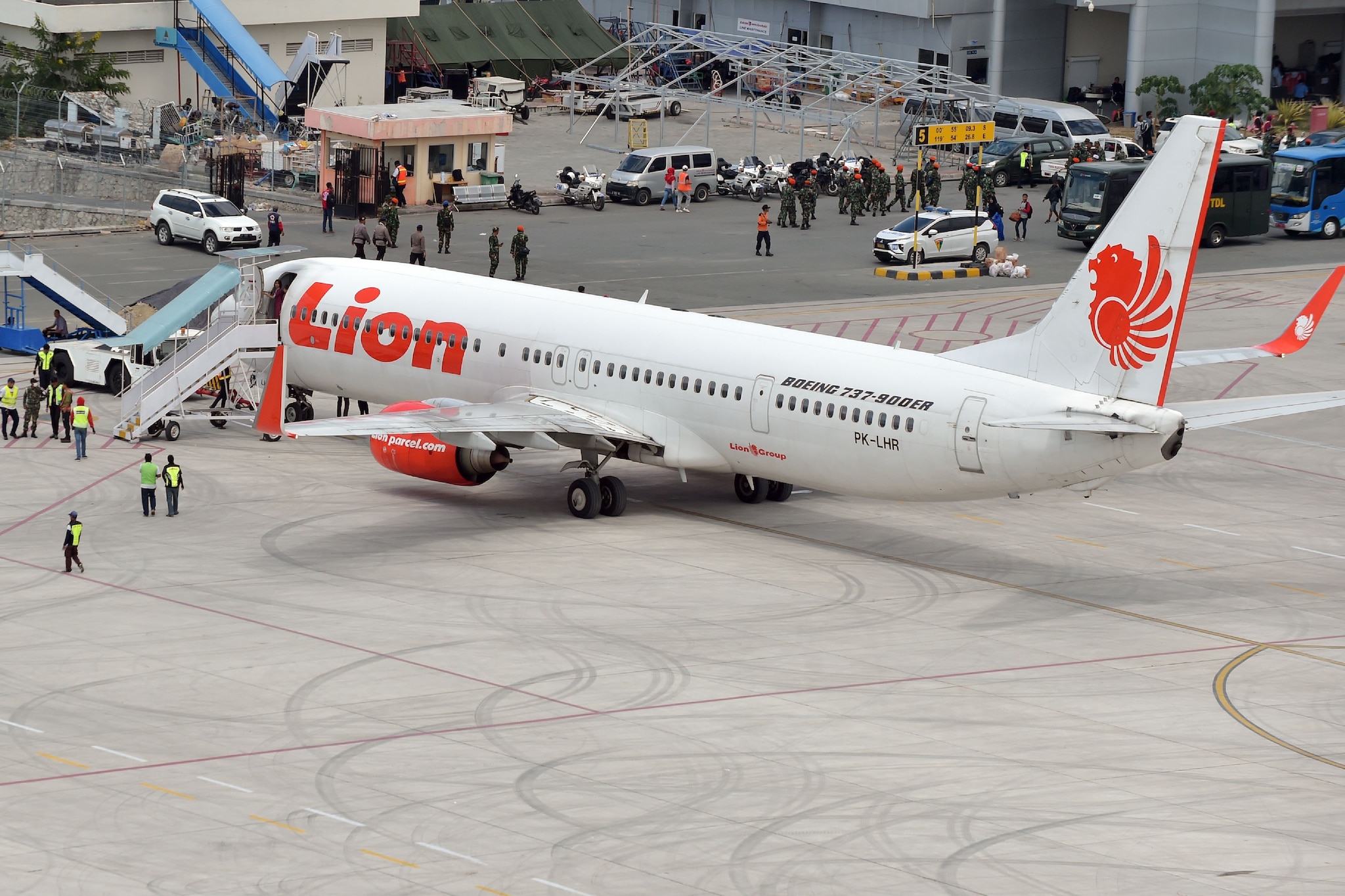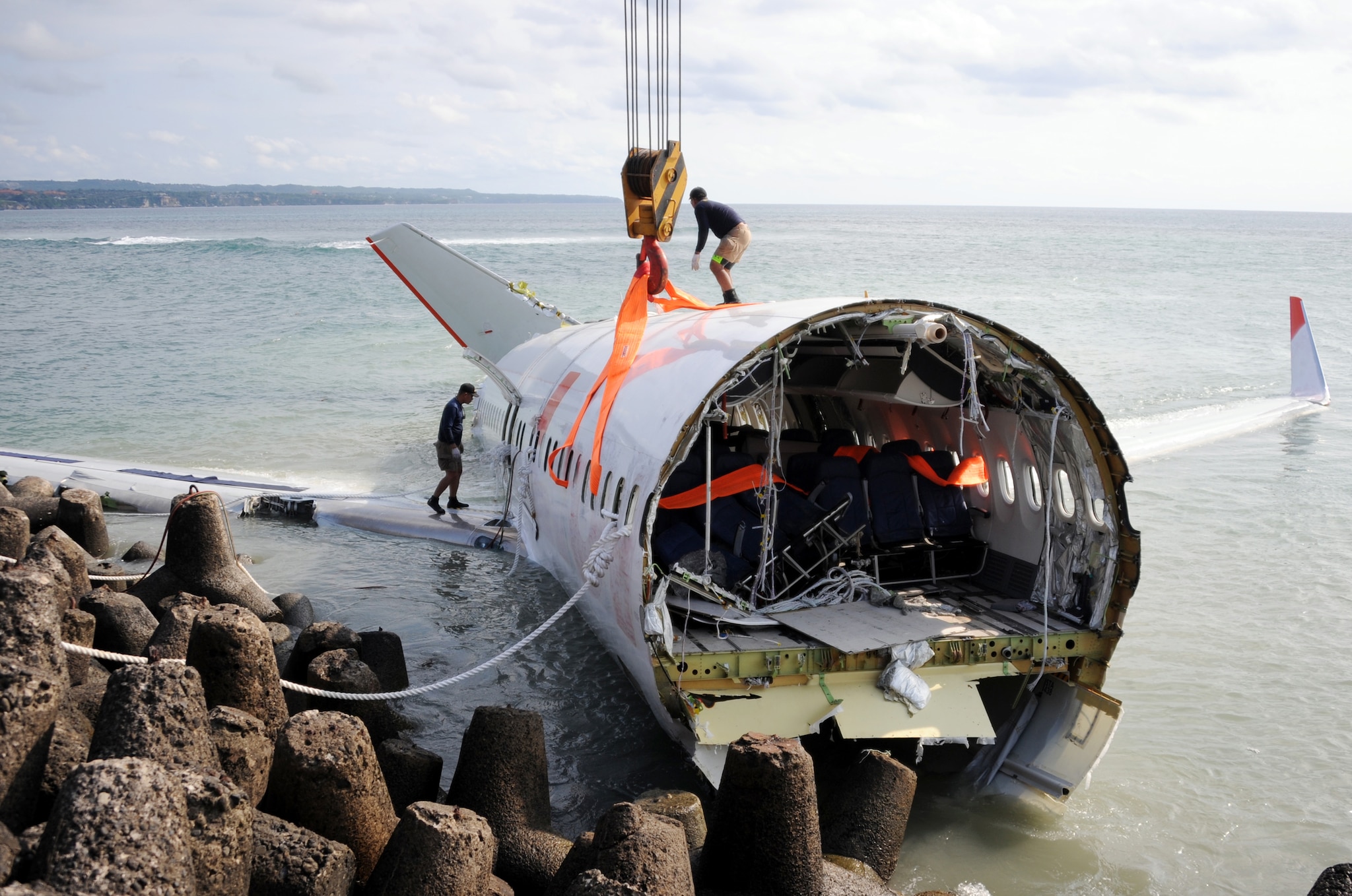As divers search for the wreckage of the Lion Air plane that crashed into the water off the coast of Indonesia with189 passengers and crew on board, many are asking how this could happen to a brand new aircraft.
The Flight JT 610 crash is the first major air disaster involving the brand new Boeing 737 MAX 8 aircraft.
While it is too early to determine why a new plane plummeted into the ocean, Lion Air has revealed the plane experienced a technical fault on an earlier flight. A technical logbook detailed an "unreliable" airspeed reading instrument on the Bali-Jakarta flight on Sunday and different altitude readings on the captain and first officer's instruments, according to the BBC.
A technical logbook detailed an "unreliable" airspeed reading instrument on the Bali-Jakarta flight on Sunday and different altitude readings on the captain and first officer's instruments, according to the BBC.

Indonesian rescue team members have retrieved body parts from the water where a plane crashed. Source: AAP
Copies of several Lion Air technical documents have been circulating on social media, but they could not be immediately confirmed as authentic and the carrier did not return calls seeking comment.
Two passengers on the plane's previous flight told TVONe the plane felt like it "was losing power and unable to rise" and that "some passengers began to panic and vomit".
Aviation experts say it's extremely rare for a plane that had only been flying since August to suffer a major problem. Dr Peter Bruce, an airlines operations expert, told SBS News that despite their limited mileage, planes undergo rigorous procedures - much like cars coming off a production line- before they are cleared for travel.
Dr Peter Bruce, an airlines operations expert, told SBS News that despite their limited mileage, planes undergo rigorous procedures - much like cars coming off a production line- before they are cleared for travel.

A rescue team collect debris from a crashed plane at Tanjung Priok Harbour, Jakarta, Indonesia, on Tuesday, October 30, 2018. Source: SIPA USA
"An aircraft coming out of a manufacturer will be in pretty good shape. It will be compliant with all the regulations, it will be technically sound, it won't be released by the manufacturer and it wouldn't be accepted by an airline unless it meets all the compliance and regulatory standards anyway," he told SBS News.
"The same as a new car comes off the production line, it wouldn't be accepted if it had problems.
Lion Air chief executive Edward Sirait declined to specify the exact nature of the fault.
"There was a report of a technical issue which had been resolved according to procedure." The model involved in Monday's incident was . It ordered up to 218 of the Boeing 737 MAX planes and currently operates 11 of the same aircraft.
The model involved in Monday's incident was . It ordered up to 218 of the Boeing 737 MAX planes and currently operates 11 of the same aircraft.

Debris from the crashed Lion Air plane in the sea off the coast of Tanjung Pakis Karawang, Indonesia, 29 October 2018. Source: EPA
The plane that was involved in Monday's incident has only been in operation since August 15.
"[New planes] may come out with some issues," Dr Bruce said.
"But they will be fixed before entering service and they would be minor things. In aircrafts things don't work sometimes but there are always systems that are built in for redundancy purposes."
Dr Bruce said the Boeing model is a tried and tested system that dates back to the 1960s.
"They're tested to a very rigorous standard. The MAX 8 is a 737, it's a new product, but it is also a long line of 737's back into the 60s. So the aeroplane model has been around but obviously been improved over decades," he said.
"And new models are a highly sophisticated aircraft in their own right."
No need to ground fleet
Lion Air chief Mr Sirait said there was no plan to ground the rest of its Boeing 737 MAX 8 fleet. But on Tuesday, Indonesia's transport minister called for all MAX 8 aircrafts belonging to Indonesian commercial airlines to be inspected.
Dr Bruce, the director of postgraduate courses for the Department of Aviation at the Swinburne University of Technology, said grounding an entire fleet is rare because all planes are tested individually.
"Occasionally fleets get grounded, but these days with the rigorous testing procedures it is very, very rare. I would think it is an unusual anomaly."
Boeing reportedly suspended release of the 737 MAX just days out from its first commercial delivery last year due to an engine issue, according to airline safety and product review site airlineratings.com.
But according to Boeing, the 737 MAX series is the fastest-selling plane in its history. The 737 model also has no rival with more than 10,000 aircraft produced since its introduction, eclipsing the Airbus A320 family model.
The 737 MAX series has been ordered by some of the world's top airlines including Southwest Airlines, United Airlines, Norwegian and Ryanair, according to .
Poor safety record
Indonesia relies heavily on air transport to connect its thousands of islands but has a poor aviation safety record and has suffered several fatal crashes in recent years.
A 12-year-old boy was the sole survivor of a plane crash that killed eight people in mountainous eastern Indonesia in August.
In August 2015, a commercial passenger aircraft operated by Indonesian carrier Trigana crashed in Papua due to bad weather, killing all 54 people on board. A Lion Air commercial plane photographed on October 7, 2018.
A Lion Air commercial plane photographed on October 7, 2018.

In 2014, an AirAsia plane crashed with the loss of 162 lives.
Indonesian investigators' final report showed a chronically faulty component in a rudder control system, poor maintenance and the pilots' inadequate response were major factors in what was supposed to be a routine flight from the Indonesian city of Surabaya to Singapore.
Lion Air, a low-cost airline, has been involved in a number of incidents.
Last year one of its Boeing jets collided with a Wings Air plane as it landed at Kualanamu airport on the island of Sumatra, although no one was injured.
In May 2016, two Lion Air planes collided at Jakarta's Soekarno-Hatta airport, while a month earlier a plane operated by Batik Air - part of the Lion Group - clipped a TransNusa plane.
In 2013 a Lion Air jet with a rookie pilot at the controls undershot the runway and crashed into the sea in Bali, splitting the plane in two. Several people were injured in the crash, although no one was killed. Lion Air Boeing 737 removed from the sea after a crash near Denpasar on April 17, 2013.
Lion Air Boeing 737 removed from the sea after a crash near Denpasar on April 17, 2013.

Indonesia's air travel industry is booming, with the number of domestic passengers growing significantly over the past decade, but it has acquired a reputation for poor regulation.
Last year the Indonesian air traffic controllers association revealed that the rate of take-off and landings in Jakarta allowed by state-run air navigation company AirNav was more than the airport could handle, increasing the chance of accidents.
The country's carriers have in the past faced years-long bans from entering European Union and US airspace over their safety records.
- With AAP, Reuters and AFP

